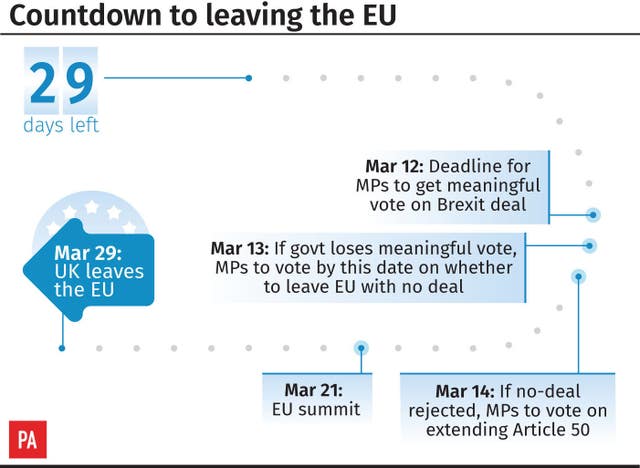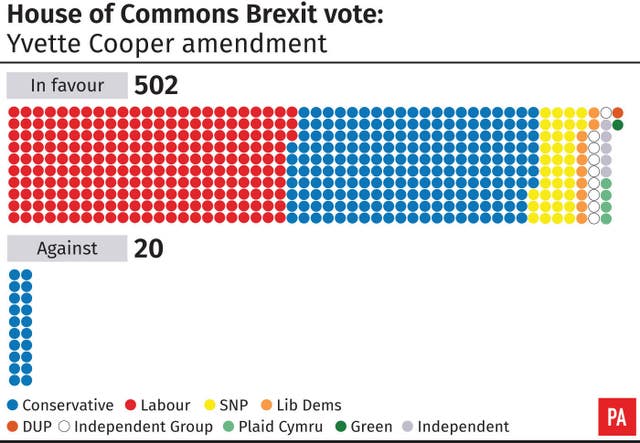Labour to push for Commons vote on second Brexit referendum – John McDonnell
Shadow chancellor John McDonnell said the showdown over a so-called people’s vote could take place as soon as next week.

Labour will push for a vote on calling a second referendum as soon as Theresa May brings her Brexit deal back to the Commons.
Shadow chancellor John McDonnell said Labour would take the first opportunity to test whether MPs will back a public vote.
But he stressed that Jeremy Corbyn’s party would also continue to press for its own Brexit vision and was still calling for a general election.
Labour’s Brexit blueprint was defeated by 240 votes to 323 in the Commons on Wednesday night and Mr Corbyn confirmed Labour would now back a referendum if faced with a “damaging Tory Brexit” or a no-deal departure from the European Union.
But he insisted that Labour would also continue to support “other available options” to prevent either the Prime Minister’s deal or the UK crashing out without an agreement.
On ITV’s Peston, the shadow chancellor set out Labour’s approach, saying the move would be made when Mrs May next risks a meaningful vote on her Brexit deal.
“That’s the time when we will have to put the amendment up,” he said.
But he added: “We are still going to argue that we want a general election, we are still going to argue we think our deal that we have put up was the best option.”
He suggested “either a deal will go through which will protect jobs and the economy or, to get some deal through, it will be conditional on going back to the people”.

Labour MPs Peter Kyle and Phil Wilson have put forward a compromise plan to back Mrs May’s deal with the condition that it is then put to a confirmatory public vote.
Mr Corbyn has come under pressure from the Labour ranks to throw the party’s full weight behind a second referendum.
After the result in the Commons, shadow Brexit spokesman Matthew Pennycook said it was “now time to wholeheartedly get behind efforts to facilitate a new public vote that includes the option of staying in the EU”.
Owen Smith, who was sacked from the shadow cabinet for calling for a second referendum, told the Press Association: “Now that Labour’s version of Brexit has been rejected by Parliament, I expect Jeremy Corbyn to throw his full weight behind campaigning for a public vote.”
But former minister Caroline Flint warned that a second referendum would be opposed by a number of Labour MPs, as well as members and voters who “want the Labour Party to stand by its promise, and the promise was to respect the referendum”.

The Prime Minster’s dramatic announcement on Tuesday that she would allow MPs to vote on delaying the UK’s EU withdrawal beyond March 29 took the sting out of Wednesday’s Brexit votes which had been expected to trigger a number of ministerial resignations.
An amendment tabled by Labour’s Yvette Cooper, designed to pin the PM down by placing her promise in a motion approved by Parliament, was passed by a majority of 482 – with 20 Tory hardliners opposing it and scores of Conservatives abstaining.
Just 204 of the party’s 313 MPs who were eligible to vote backed the measure.

Any more significant Conservative bust-ups have now been delayed for up to two weeks, as Mrs May prepares to bring her Withdrawal Agreement back to the Commons for a “meaningful vote” by March 12, although there have been hints the showdown could be as soon as next week.
Meanwhile, Health Secretary Matt Hancock again insisted that medicine supplies would be unhindered if there was a no-deal Brexit, following warnings from the Royal College of Radiologists that some cancer treatments may have to be delayed.
He told BBC’s Newsnight: “My message, very clearly to those who have cancer, is that we have arrangements in place to ensure that whatever the Brexit scenarios and circumstances, we can get the medicines in that are needed.
“That’s something that we have to plan for, whether we want no-deal to happen or not, because it is something that could happen.”





